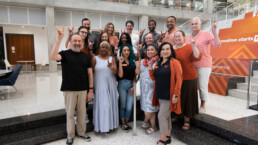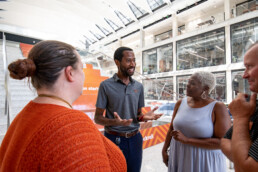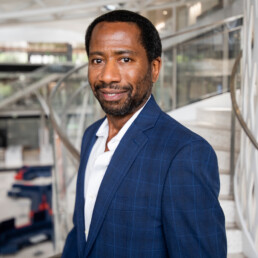by Maria Arrellaga
Woodrow W. Winchester, III is a lifelong learner, a trait that suits him well as the new executive director of Texas Engineering Executive Education (TxEEE), the Cockrell School’s professional development program. He’s the first in his family to pursue engineering as a career path. But as a child growing up in North Carolina, he dreamt of studying architecture, a goal he still holds close today.
Winchester’s thirst for knowledge extends to the world of wine as well. An avid Hill Country visitor, he has completed courses through Wine & Spirit Education Trust, one of the leading providers of wine education in the world.
Winchester’s journey is a perfect example of the fact that careers are long and can go in any number of directions. TxEEE exists to ensure that people can pursue their dreams of engineering, and also enhance their skills, no matter when in life they choose to walk that path.
TxEEE Levels Up
TxEEE helps its students improve their engineering skills, but the program itself is also leveling up.

The program recently achieved formal certification from the American Society for Engineering Management for its engineering management program. The honor makes TxEEE only the 10th program to achieve this certification.
The approval provides UT Engineering Management graduates with a direct path to professional certification as a Certified Associate in Engineering Management or a Certified Professional in Engineering Management. Graduates seeking the CAEM or CPEM credentials from non-credentialed programs must pass a certifying exam, in addition to completing their engineering management degree.
To qualify for certification, ASEM completes a comprehensive review of the engineering management curriculum, ensuring that established program standards in faculty, curriculum, admission and administrative support are met. UT Austin’s engineering management program graduates will now be able to display their electronic badge degree credentials on resumes, email and other digital communications.

Woodrow Winchester, III at TxEEE’s annual retreat.
Read on to learn more about Winchester, who served as a professor of practice and director of Professional Engineering Programs in the College of Engineering and Information Technology at the University of Maryland, Baltimore County, before joining UT Austin in 2022; his plans for TxEEE; his work on Diversity, Equity and Inclusion programs and more.
What most excites you about taking on this new role?
The engineering education landscape is changing. As a function of a more complex, technology-driven, and interconnected world, continuing and lifelong learning for engineers is paramount. Emerging educational models such as the Sixty-Year Curriculum (60YC) illustrate this need. I am excited about positioning TxEEE as Cockrell’s fulcrum in providing innovative and accessible programs and courses that enable engineers to skill and reskill, as their professional and personal contexts change. Core to these efforts will be building and fostering meaningful partnerships with our world-class faculty, institutes and centers within the Cockrell School. An example is our very successful Introduction to Energy, Technology & Policy course in partnership with the Webber Energy Group, which has prepared hundreds with the understanding and skills to navigate the changing energy landscape. At TxEEE, we see and say that what starts here, enables lifelong career and workplace success!
You have talked about ‘Talent Strong Texas.’ Can you explain what that program is all about?
Last December, I had the opportunity to meet with Texas Higher Education Coordinating Board Commissioner Harrison Keller to discuss the board’s strategic plan, Building a Talent Strong Texas.
The plan focuses on the educational needs, not only of recent high school graduates, but all adult learners throughout the various stages of their careers. The plan celebrates that educational credentials should come in many formats and designs, and they must be of value to Texas’ business needs. Talent Strong Texas embraces that research and innovation must be aligned with educational programming to keep pace with our society’s needs. I fully subscribe to this notion. Lastly, the plan commits to equity, stating that if Texas doesn’t advance the goals equitably, then how can the goals be met? I couldn’t agree more, and I plan to use Talent Strong Texas as a guidepost for our TxEEE planning and work.
You’ve written extensively about the importance of Diversity, Equity and Inclusion in engineering and technology. Tell us more about your work in this area and how you plan to incorporate those ideals in your new role.
As engineering is looked to for solutions to some of society’s great challenges (see the 14 Grand Challenges for Engineering), engineers must think and act inclusively and equitably. This way of being for the engineer is fundamental to offering technological solutions that both recognize and consider the diversity and complexity of humanity. As a response, my research seeks to inspire the development and use of more inclusive, equitable and just approaches to designing and managing technological systems. My work around Afrofuturism in technological design highlights such approaches.
The relevancy of this work to TxEEE is strong! For example, as we think about advancing clean and renewable energy solutions, developing talent that is equipped with state-of-the-art technical knowledge and skills, and also possesses the competencies and sensibilities to appropriately understand and grapple with considerations of inclusion and equity in systems design and deployment is paramount (see our newly launched Inclusive Engineering Fundamentals course). This is core to our capacity to realize more sustainable, just and equitable energy futures.
What is the background of your very unique name?
I was named after my dad who was named after his father, my grandfather. He was named after former President Woodrow Wilson. Why? Unfortunately, or maybe fortunately, I will never know; as my grandfather died before I was born. I do know that he was of the generation of Black Southerners who often named their children after presidents as a means to manifest generational greatness. Mission accomplished, TBD!
When you are not working, what do you like to do with your free time and do you have any newfound interests to pursue in Austin?
I love wine and enjoy visiting Hill Country wineries and tasting rooms. William Chris Vineyards is one of my favorites. I am also formally studying wine! I have just completed and successfully passed the Wine & Spirit Education Trust (WSET) Level 1 Award course. My goal is to reach WSET Level 3. I am enjoying how my educational journey in wines is reinforcing and enhancing my appreciation of culture, context and nuance in meaning and decision-making.

Learn more about Woodrow W. Winchester, III.